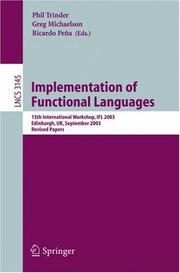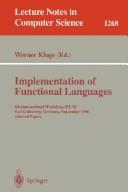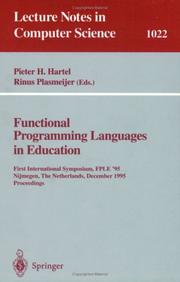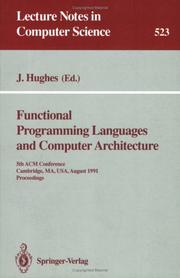| Listing 1 - 4 of 4 |
Sort by
|

ISSN: 03029743 ISBN: 3540237275 3540278613 9783540237273 Year: 2004 Volume: 3145 Publisher: Berlin: Springer,
Abstract | Keywords | Export | Availability | Bookmark
 Loading...
Loading...Choose an application
- Reference Manager
- EndNote
- RefWorks (Direct export to RefWorks)

ISBN: 3540632379 3540692398 9783540632375 Year: 1997 Volume: 1268 Publisher: Berlin, Heidelberg : Springer Berlin Heidelberg : Imprint: Springer,
Abstract | Keywords | Export | Availability | Bookmark
 Loading...
Loading...Choose an application
- Reference Manager
- EndNote
- RefWorks (Direct export to RefWorks)
This book contains the strictly refereed post-workshop proceedings originating from the 8th International Workshop on the Implementation of Functional Languages, held in Bad Godesberg, Germany, in September 1996. The 15 thoroughly revised full papers presented were selected after a second round of reviewing from the 26 contributions accepted for presentation at the workshop. Also included is an overview by the volume editor. The volume addresses various implementational issues of functional languages including parallel implementations, language concepts and design, type systems, interpretation and compilation techniques, automatic program generation, concurrent processing, machine architectures, runtime profiling and application programming.
Functional programming languages --- Congresses. --- Computer science. --- Computer programming. --- Programming languages (Electronic computers). --- Computer logic. --- Computer Science. --- Programming Languages, Compilers, Interpreters. --- Programming Techniques. --- Logics and Meanings of Programs. --- Congresses --- Logic design. --- Informatics --- Science --- Design, Logic --- Design of logic systems --- Digital electronics --- Electronic circuit design --- Logic circuits --- Machine theory --- Switching theory --- Computer science logic --- Logic, Symbolic and mathematical --- Computers --- Electronic computer programming --- Electronic data processing --- Electronic digital computers --- Programming (Electronic computers) --- Coding theory --- Computer languages --- Computer program languages --- Computer programming languages --- Machine language --- Languages, Artificial --- Programming --- Functional programming languages - Congresses. --- Programming languages (Electronic computers)

ISBN: 3540606750 0387606750 3540492526 9783540606758 Year: 1995 Volume: 1022 Publisher: Berlin: Springer,
Abstract | Keywords | Export | Availability | Bookmark
 Loading...
Loading...Choose an application
- Reference Manager
- EndNote
- RefWorks (Direct export to RefWorks)
This book constitutes the refereed proceedings of the First International Symposium on Functional Programming Languages in Education, FPLE '95, held in Nijmegen, The Netherlands in December 1995. The 17 revised full papers included represent the current state-of-the-art in using functional languages in computer science education. Most papers report teaching experience in some detail, however, the emphasis is generally on technical issues. Functional languages are increasingly used for teaching in a number of important areas such as algorithms, data structures, compiler construction, computer architecture, computer graphics, mathematics, problem solving and the semantics of programming languages.
Functional programming languages --- Computer-assisted instruction --- Congresses. --- -Functional programming languages --- -681.3*D11 --- 681.3*K31 --- Programming languages (Electronic computers) --- CAI (Computer-assisted instruction) --- Computer-aided instruction --- Computer-assisted learning --- Computer based instruction --- Computer-enhanced learning --- Electronic data processing in programmed instruction --- ILSs (Integrated learning systems) --- Integrated learning systems --- Microcomputer-aided instruction --- Microcomputer-assisted instruction --- Microcomputer-assisted learning --- Microcomputer-based instruction --- Teaching --- Education --- Educational technology --- Programmed instruction --- Telematics --- Congresses --- Applicative (functional) programming --- Computer uses in education: computer-assisted instruction; CAI; computer-managed instruction; CMI --- Data processing --- 681.3*K31 Computer uses in education: computer-assisted instruction; CAI; computer-managed instruction; CMI --- 681.3*D11 Applicative (functional) programming --- 681.3*D11 --- Computer science. --- Logic design. --- Programming Languages, Compilers, Interpreters. --- Programming Techniques. --- Logics and Meanings of Programs. --- Design, Logic --- Design of logic systems --- Digital electronics --- Electronic circuit design --- Logic circuits --- Machine theory --- Switching theory --- Informatics --- Science --- Functional programming languages - Congresses. --- Computer-assisted instruction - Congresses

ISBN: 0387543961 3540543961 3540475990 Year: 1991 Volume: vol 523 Publisher: Berlin New York Springer-Verlag
Abstract | Keywords | Export | Availability | Bookmark
 Loading...
Loading...Choose an application
- Reference Manager
- EndNote
- RefWorks (Direct export to RefWorks)
This book offers a comprehensive view of the best and the latest work in functional programming. It is the proceedings of a major international conference and contains 30 papers selected from 126 submitted. A number of themes emerge. One is a growing interest in types: powerful type systems or type checkers supporting overloading, coercion, dynamic types, and incremental inference; linear types to optimize storage, and polymorphic types to optimize semantic analysis. The hot topic of partial evaluation is well represented: techniques for higher-order binding-time analysis, assuring termination of partial evaluation, and improving the residual programs a partial evaluator generates. The thorny problem of manipulating state in functional languages is addressed: one paper even argues that parallel programs with side-effects can be "more declarative" than purely functional ones. Theoretical work covers a new model of types based on projections, parametricity, a connection between strictness analysis and logic, and a discussion of efficient implementations of the lambda-calculus. The connection with computer architecture and a variety of other topics are also addressed.
Computer architecture --- -Functional programming languages --- -681.3*C0 --- 681.3*D11 --- 681.3*D31 --- 681.3*D34 --- Programming languages (Electronic computers) --- Architecture, Computer --- Congresses --- Computerwetenschap--?*C0 --- Applicative (functional) programming --- Formal definitions and theory: semantics; syntax (Programming languages)--See also {681.3*D21}; {681.3*F31}; {681.3*F32}; {681.3*F42}; {681.3*F43} --- Processors: code generation; compilers; interpreters; optimization; parsing; preprocessors; run-time environments; translator writing systems and compilergenerators (Programming languages) --- 681.3*D34 Processors: code generation; compilers; interpreters; optimization; parsing; preprocessors; run-time environments; translator writing systems and compilergenerators (Programming languages) --- 681.3*D31 Formal definitions and theory: semantics; syntax (Programming languages)--See also {681.3*D21}; {681.3*F31}; {681.3*F32}; {681.3*F42}; {681.3*F43} --- 681.3*D11 Applicative (functional) programming --- Functional programming languages --- 681.3*C0 --- Functional programming languages - Congresses. --- Computer architecture - Congresses. --- Computer network architectures. --- Computer science. --- Logic design. --- Computer System Implementation. --- Programming Languages, Compilers, Interpreters. --- Processor Architectures. --- Programming Techniques. --- Logics and Meanings of Programs. --- Design, Logic --- Design of logic systems --- Digital electronics --- Electronic circuit design --- Logic circuits --- Machine theory --- Switching theory --- Informatics --- Science --- Architectures, Computer network --- Network architectures, Computer
| Listing 1 - 4 of 4 |
Sort by
|

 Search
Search Feedback
Feedback About UniCat
About UniCat  Help
Help News
News